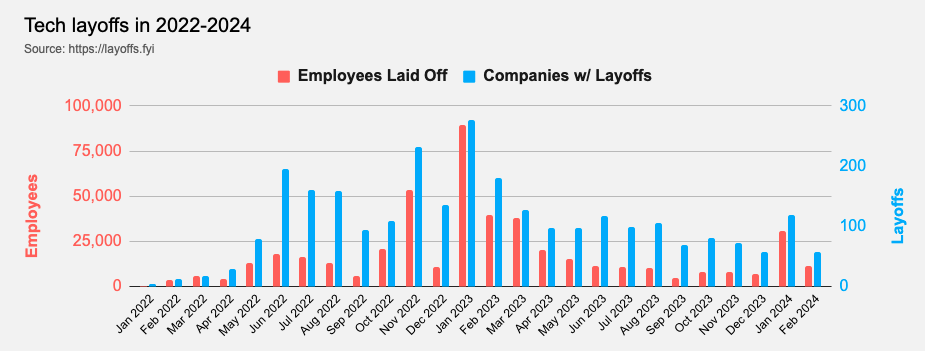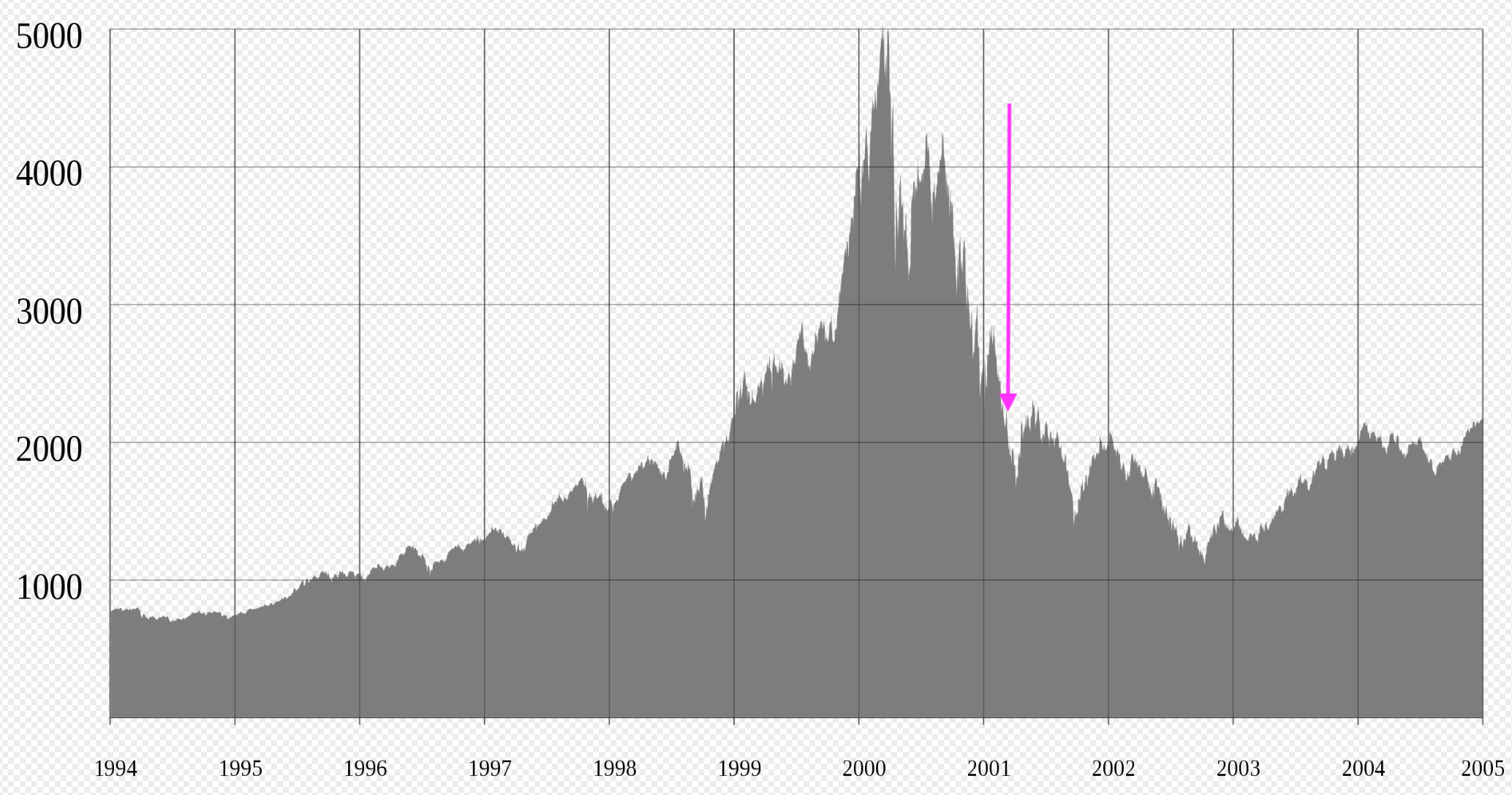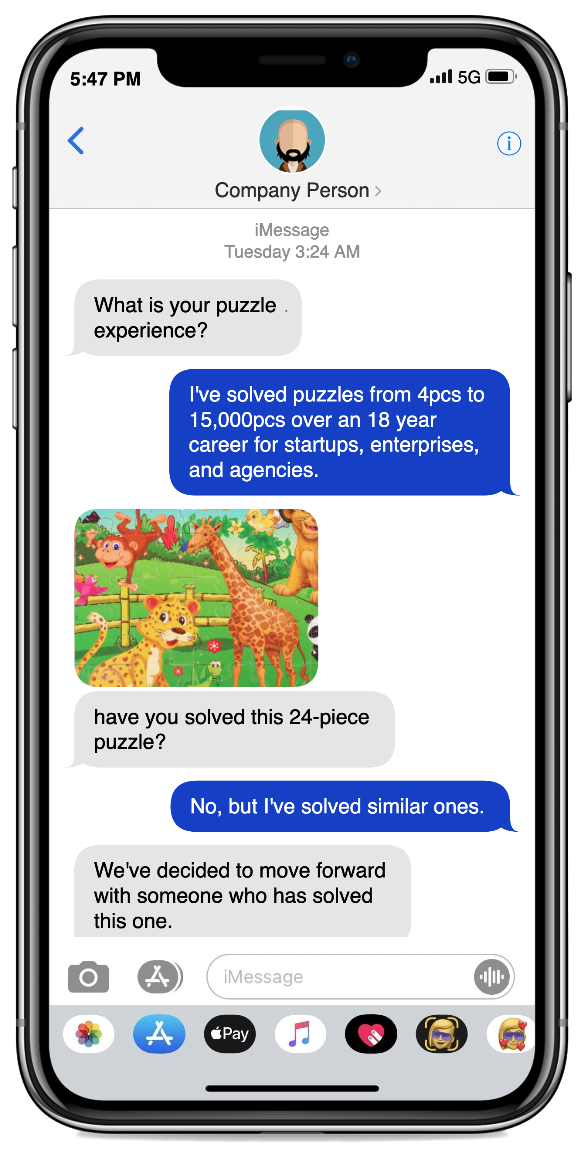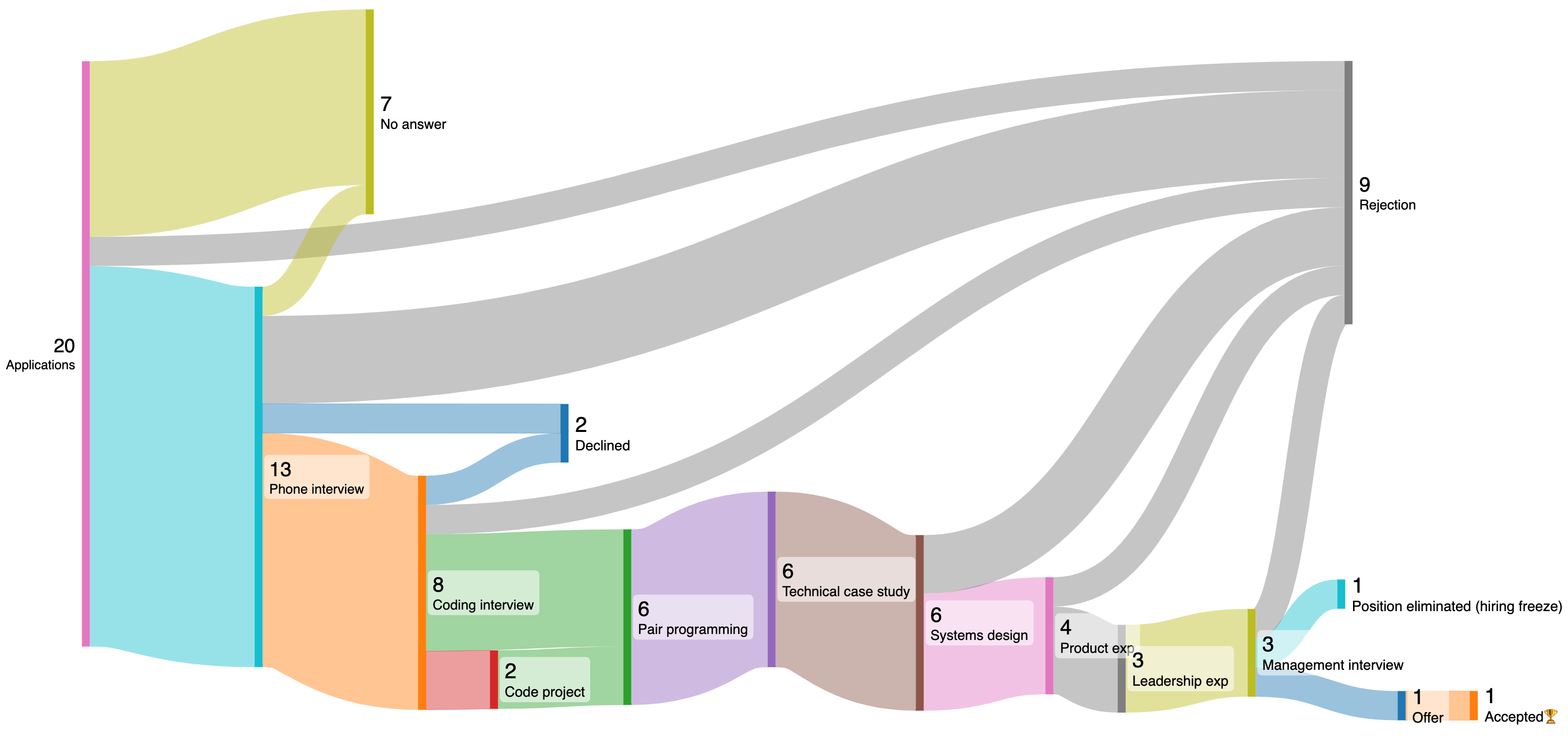Welcome back, stranger. Remember, its about their needs, not yours.

From Q4 2022 through Q1 2024 the tech industry has seen a shit-ton of layoffs. These are due to a combination of factors:
- The end of the ZIRP: Zero Interest Rate PolicyZIRP era, higher interest rates means investors demand profitability (instead of growth) from portfolio companies.
- In 2017, Section 174 of the US tax code changed, taking effect in 20221.
- Companies with a remote-first culture are hiring nationally, even globally2.
- A market correction from over-hiring during the pandemic.
- The hype surrounding AI tools lead to preemptive downsizing3.
The unfortunate outcome of all these layoffs is the impact on these employees. Employment is a critical part of people’s lives, and layoffs can leave long-lasting emotional scars. A job is a zeitgeber: German for time giverzeitgeber, and aside from the circadian rhythm, it is the dominant structural organizer for the cadence of daily life. This is why unemployment is so destabilizing, it arrives as the feeling of vertigo—the ground below has suddenly fallen away, and that nothing is what it was. It manifests as a gradual sense of derealization is detachment from ones surroundingsderealization, as if the world isn’t real, as if you are in a dream. Unemployment is an anxious mental liminal space, a waiting room where control is largely in the hands of others—waiting for replies, waiting for call-backs, waiting for upcoming interview dates, waiting to hear back, wondering why. These feelings will pass, it is temporary.
The next hurdle is the mental investment in perpetual studying and the preparation for technical interviews (which are a poor predictor of performance). The labor is never good enough, never prepares you for all eventualities, and is never complete. Then there is the emotional labor of courting potential corporate suitors, imagining yourself in the role, asking the good questions, showing passion and craftsmanship only to hear them say: unfortunately we’re moving forward with other candidates
.
You are not your job title. Being laid off says nothing about you or your worth, certainly nothing about your value as a person; they are simply the result of a calculation to further the interests of the company. Layoffs are a failure of management that socialize losses and privatize profits.
My Experience with Layoffs

For many this will be the first layoff experience of their career, and I feel for them. I’ve been here before, quite a few times in fact, perhaps you can benefit from my experience.
I started my career in software engineering as an intern at Rovia was an early e-book pioneera tech startup during the dot-com crash of 2001. My internship promptly ended when the company closed and laid off most of its employees the week after I started. Aside from not having a job to help pay for rent, I didn’t earn those course credits that were a part of my graduation requirement. I went back to university for six months and then had an opportunity to make up that course credit at EMC² (Now Dell EMC) the following year. That internship also ended with another mass layoff—this time because of the post-9/11 stock market downturn of 2002. For the remainder of my time at university, I focused on the course work. I let time sort out the economy while I wasn’t participating in it.
I tend to think of employment in tech as riding a bull. Not a big bull-riding spectator, but from what little I have seen, it really isn’t about whether you are going to stay on the bull or not. You are going to get thrown off, it’s just a matter of when.
Ned Utzig An Old Hackers Tips on Staying Employed
Eventually I graduated into the post-crash era, and had a few good jobs. In a turn of luck, I managed to avoid the 2007–2008 financial crisis unscathed—despite joining the volatile startup n2N Commerce in September of 2007. The vibe there was off, and executive leadership was at odds with product leadership. I left n2N right before the December holidays after only 3 months, landing a job with a friend at interactive agency RDVO. On January 2nd, my former boss at n2N called me—n2N had just done a massive round of layoffs and was ceasing operations, he wanted to know if I knew it was going to happen. I didnʼt, but the vibe had raised my suspicions. I walked away unscathed by the holiday disaster, it would be a formative experience in trusting my gut.
I worked handful of other jobs before joining startup Cinch Financial. There we used behavioral economics to nudge people towards positive personal financial decision making. The the company eschewed recommending “pay-to-play” products to our customers: as a fiduciary, we actually did recommend the best products for our customers. It felt right. The team was experimental and fun. We had small and agile teams with a pragmatically groomed backlog. We ran tightly iterative dev-UX release cycles with continuous deployment. We encouraged a non-burnout culture. We tried things, failed, and had psychological safety to take real risks. Cinch ceased operations in September 2018 during an acquisition attempt when it simply ran out of runway and failed to take flight. The entire team was laid off. I co-organized the Boston Ember.js Community meetup while at Cinch, and that was a major contributor to helping me land up at Salsify—they were a frequent host of our meetups.
I joined Salsify in October of 2018, less than a month after Cinch. Like many tech startups of the ZIRP era, it was on a growth trajectory. It had a strong engineering-lead culture, some interesting R&D, a steady march of new product features, and we did a few acquisitions. Salsify went through 3 rounds of layoffs in April 2020, November 2022, and October 2023—the last of which eliminated the entire business vertical I was in, and many amazing people were let go, world-class engineers, designers, product & sales people.
Gareth Mallory:
I only have one question. Why not-stay dead?
James Bond:Do you get out in the field much?
Gareth Mallory:You don’t need to be an operative to see the obvious. It’s a young man’s game.Skyfall (2012)
After the layoff at Salsify, I quickly dipped my toe back into interviewing, if just to practice. I probably started too soon, I wasn’t really sure what I was looking for, however, it was good to practice interviewing.
2023 was a difficult year for my family, it was a year of crisis. My mother had a stroke, we had two relatives in the family die, our grandma went into the hospital, and our dog died suddenly (the latter four all happened between December 24 and January 2nd).
I finished out Q4 2023 by reflecting on my career and tried (and failed) to rest during the holidays. It was my season of wintering. Katherine May describes a wintering as a fallow period in life when you’re cut off from the world, feeling rejected, side-lined, blocked from progress, or cast into the role of an out-sider. Perhaps it results from an illness or a life event such as a bereavement or the birth of a child; perhaps it comes from a humiliation or failure. Perhaps you’re in a period of transition and have temporarily fallen between two worlds. Some winterings creep upon us more slowly, accompanying the protracted death of a relationship, the gradual ratcheting up of caring responsibilities as our parents age, the drip-drip-drip of lost confidence. Some are appallingly sudden, like discovering one day that your skills are considered obsolete, the company you worked for has gone bankrupt…
4. A few of those felt especially relevant to me, namely “caring responsibilities as our parents age”, the “drip-drip-drip of lost confidence”, and the fear that “one day that your skills are considered obsolete”—especially in the face of the impostor syndrome resulting from interviewing and the looming threat of AI.
My wintering provided some space to daydream, reflect, and complete projects I’d been too preoccupied to do:
- reflected on my time at Salsify
- connected with friends.
- installed a new kitchen faucet.
- replaced old laptop batteries.
- consolidated a sprawling mess of cloud services to iCloud.
- read a few books.
- pruned & caught up on a large backlog of tech blogs.
- took some online courses in newer web tech.
- reorganized bookshelves.
- digitized our family photos.
- finished a bunch of personal projects.
- 🥳 refactored my Neovim config to Lua & LSP 🎉.
- refactored this blog.
- started writing on topics that I’d been Woolgathering refers to indulging in aimless thought, daydreaming, or contemplation without a specific purpose. It can involve allowing one’s mind to wander freely, fostering creativity and introspectionwoolgathering for far too long.
My Job Search
I re-started the job search in earnest in early January and shifted my search to mature, publicly traded software companies. I’m convinced that startups in the US are in for a very difficult time unless theyʼre in AI, crypto, or tough tech ventures address significant real-world problems, often with long development timelines and high technical uncertaintytough tech.
After a few months of searching, it is hands-down the most difficult job market I’ve ever seen. There is a pool of world-class engineers available. I personally know more great unemployed talent now than ever in my entire career. I suspect the Department of Labor statistics arenʼt reflecting how bad it really is because many of these workers are havenʼt filed for unemployment because a privilege, but one every worker should gettheyʼre still on severance. The interview process is far more difficult both in terms of technical breadth, depth, ‘soft-skillsʼ, and incidentals. Employers are expecting “batteries included” engineers who require 0-training, 0-investment, and fully-fit to their needs. Itʼs an employers market, so they expect to get the best, most committed engineers, and they’re able to down-level at a discount.

For the first time in my career, I got no responses to applications, or companies ghosted me after the initial call. privilege of the software engineerNeither of these had happened in any previous job search. If it is this difficult for a cis, white, male startup veteran, what are the chances for a non-white, non-male, with less experience and without a network to fall back on? In the past, job interviews for senior roles had fewer rounds, but now they’ve increased to 7-8 rounds with more code challenges. There are now at least 2, often 3, coding exercises, along with discussions about technical experience, product & design, leadership, and behavior. The difficulty level of coding questions has also risen from LeetCode easy to medium/hard. As the process progresses, companies become more selective, especially since they have many strong candidates. The final decision often depends on smaller details, what particular library or framework you’ve used, or simple “match making.”

Some take-aways: I didn’t make it through the interview process for any startups, only the established companies considered me. I’m not sure why, maybe startups mimic big companies’ processes without proper validation, or perhaps it’s age-related—I’m considered a greybeard now. Their technical questions tended to be easier. I had one interviewer ask me “how many dependents will you have on your healthcare plan” which I pointed out is an illegal question. He stumbled back with “Oh, I ask because our individual plan is good, but our family plan isn’t good”—he went on to describe their company culture as “we hustle, we’re usually in the office 6-days a week and long nights”. They are co-opting the hustle culture ethos and filtering for those rise-and-grind 20-something ‘entrepreneurs’. Is self-exploitation cool again? I know burnout isn’t. I noped out of that funnel, they went into the ‘Declined’ bucket along with another company that pushed back on the value of contemplative thinking and only valued calculative thinking5.
My job search, by the numbers:
- 🗓️ 125 Days Unemployed
- 📆 83 Workdays (6 major holidays)
- ➌ 3 Interviews/Week
- 🗣️ 52 Interview Rounds
- 📝 20 Applications
- 📞 13 Phone Interviews
- 🚫 9 Rejections
- 👻 7 No Answers
- 🧑💻 8 Coding Interviews
- 🧑💻 6 Pair Programming
- 🧑💻 6 Technical Case Studies
- 🧑🔬 6 Systems Designs
- 🧑🎨 4 Product Experience
- 📈 3 Leadership Experience
- 🧑⚖️ 3 Management Interviews
- 🛑 1 Position eliminated pre-offer
- 🏆 1 Offer Accepted
Advice Column
I’ll end with some advice to those still searching for work. Reach out to ex-coworkers and ask for LinkedIn references, endorsements. Reconnect with people, in real life. It’ll be good for the soul, and you can provide moral support and references for each other. Tending to your network creates luck. Ask yourself whats next. If you’ve never thought about where you’d like to be in three years, go for a walk and think about it. If you find it hard to wake up excited about work, ask yourself why, and give yourself space to think about it. Ask yourself what skills you want to learn, and start learning them by doing a project. Don’t learn for learning sake, but apply it to a project, even if an artificial one. Reflect upon your time at your last company. Write a narrative of your time you can use during interviews to describe your experience. Focus on your milestones, challenges, learnings, mistakes, growth and accomplishments. Write a long-form career narrative answering the “Tell me about yourself” question. Write it for yourself, but then shorten it to a 1-2 minute summary that you can recite during interviews. Refine it with use.
There is a ton of great talent out there, and even more impostor syndrome. I fear that a lot of great talent will start to pivot their careers away from the tech industry. Just remember, everyone is getting rejections, don’t take it personally. You are the main character, but layoffs arenʼt about you: they’re about make number go up 📈.
If I had written this article in my optimistic twenties or thirties, I wouldʼve ended with a rousing call to action: “Knowledge Workers Unite!”, but I’ve been around enough to see those efforts spark & fizzle6, and spark & fizzle again7. Iʼd advocate that we should still vote against Trump, but Bidens policy also supports the neoliberalism & globalization that is at the core of these boom-bust cycles and the cause of the flattening of our wages across the globe. Unemployment is a full time job, and it takes immense effort to keep interviewing and maintain enough energy to continue personal projects. The obvious path forward for workers in a globalized economy with increasing underemployment is Universal Basic Income.
In lieu of UBI, my call to action is something more intimate and karmic: be gentle with yourself, reconnect with yourself and those around you. Rediscover yourself. Work on your own projects, and help others with theirs. Through contemplation and connection—magical things can happen.
Footnotes
-
The change makes companies spread out R&D expenses over five years rather than expensing them immediately. This affects startups focused on growth, resulting in increased taxes for those with limited revenue. Growth startups must cut down on R&D and pivot to profitability. TL;DR the tax incentives supporting the growth era of startups in the US has ended. ↩
-
National, or international hiring drives wages down as costs of living are lower outside major US cities. This is enabling a more extensive and cost-effective talent search. This reflects the broader trends of globalization, outsourcing, and the leveling of a globalized knowledge workforce. ↩
-
This will be problematic, especially when VC funding currently subsidizing AI software eventually ends, and these companies shift to charging for their products. At that stage, these companies will find themselves in a challenging situation. ↩
-
Wintering: The Power of Rest and Retreat in Difficult Times by Katherine May. ↩
-
At this company I was asked to “describe how you solved a difficult technical problem”. I discussed the problem, and how I arrived at a solution not by calculative thinking, but arrived at a solution while on a hike in the White Mountains, or what I called “contemplative thinking”, or shower-thoughts, basically, daydreaming. The solution came to me as if an epiphany. I described contemplative thinking as a third mode of thinking in addition to the two modes of thinking described in “Thinking, Fast and Slow” by Daniel Kahneman. Kahneman calls System 1 the fast, intuitive, experienced-base, emotional, and automatic mode of thinking by going with your gut. System 2 is problem-solving, the slow, deliberate, and analytical mode of thinking. It involves careful reasoning, concentration, and conscious effort—deep focus. I argued that I often solve really gnarly problems with a third mode: Contemplation, which requires idleness, daydreaming, and seemingly non-productive mode of aimless thought that most often produces ideas that are more radically leftfield. The company reps disagreed that any value could come from such thinking, and said if i needed to focus, I could seek refuge from their open-office in an empty conference room. ↩
-
The Alphabet Workers Union is a good counter-example. Read You Deserve a Tech Union. ↩